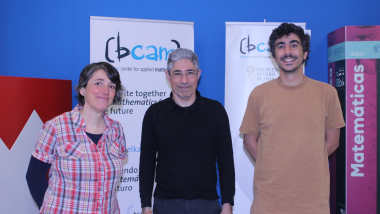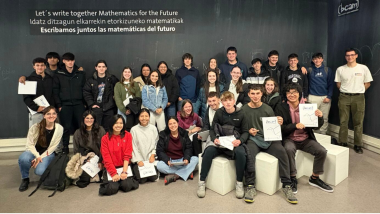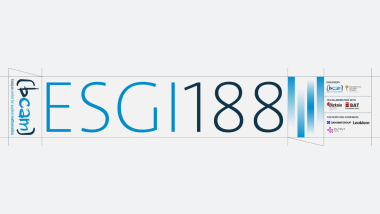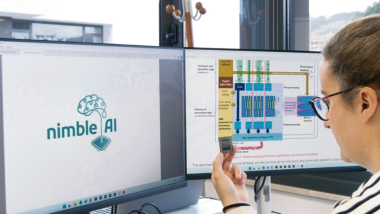Paula Gordaliza Pastor, winner of one of the Vicent Caselles Mathematical Research Awards
- The Spanish Royal Mathematical Society and the BBVA Foundation award these prizes with the aim of supporting and stimulating young professionals working in the field of mathematical research
- Paula Gordaliza Pastor did her undergraduate, master's and doctoral studies at the University of Valladolid. She is currently a postdoctoral researcher at the Basque Centre for Applied Mathematics - BCAM
- The researcher from Valladolid works in the area of Data Science and, according to the jury, "the research in her thesis concerns the interface between Mathematical Statistics, Artificial Intelligence and Data Science, mainly focused on equity in prediction/classification of machine learning models"
Six young researchers have been awarded the Vicent Caselles Mathematical Research Prize, awarded by the Spanish Royal Mathematical Society and the BBVA Foundation since 2015. This award recognises creativity, originality and achievement in the field of mathematics research in the early years of the scientific profession.
Among the award winners is Paula Gordaliza Pastor from Valladolid, postdoctoral researcher at the Basque Centre for Applied Mathematics - BCAM and associate professor at the Public University of Navarra. Gordaliza Pastor works in the area of Data Science, in mathematical research with applications in the field of Fair and Trustworthy Machine Learning.
The jury of the awards highlighted the aim of the BCAM researcher's thesis, which focuses on correcting the biases that exist in artificial intelligence (AI) algorithms. "My mathematical contributions in optimal transport theory allowed me to develop a methodology for repairing a dataset biased by the presence of certain attributes that carry sensitive information (e.g. race, gender, age, etc.)". Through this procedure, the level of repair of the original data can be roughly controlled in order to strike a balance between the accuracy of the classification algorithm subsequently trained on the data and the fairness of the classification result.
The researcher of the Machine Learning research line and associate professor at the Public University of Navarra, affirms that "this type of recognition always comes unexpectedly, as the call is very competitive and the level is very high" and stresses that "when you receive recognition, it is a great personal joy and for the whole family and professional environment and an incentive to continue advancing in research".
Society is witnessing a generalisation in the use of AI systems in all areas of human life
Paula Gordaliza Pastor graduated in Mathematics in 2016 and obtained a Research Master in Mathematics in 2017, both from the University of Valladolid. She completed her doctoral thesis under an international co-supervision agreement between the Université de Toulouse III-Paul Sabatier (France) and the University of Valladolid, which she defended in September 2020 at the Université de Toulouse III-Paul Sabatier, joining BCAM as a postdoctoral researcher.
She is currently part of the Machine Learning (ML) research line at the centre, whose main research objective is to develop novel and efficient machine learning algorithms capable of tackling new practical data-related problems.
Her scientific contributions in Probability and Mathematical Statistics contribute to try to solidly establish the mathematical theory needed to understand and the world of Artificial Intelligence and Data Science, being relevant to have been able to publish in both fields.
We are witnessing a generalisation of the use of AI systems in all professional fields and in numerous aspects of the daily life of citizens, where decisions are made that affect us in an important way. "The fact that algorithms are being used in things such as deciding whether to grant a loan by a bank, selecting a person for a contract or making a medical diagnosis raises concerns among citizens, as long as they do not perceive that there are guarantees that the result of applying these technologies is fair, honest and interpretable". The failures witnessed with AI technologies, "such as when there is an accident involving an autonomous vehicle, generate mistrust and social alarm".
The application of the theoretical results of the young researcher Paula Gordaliza aims to advance in the establishment of solid mathematical bases for machine learning, which is crucial if it is to have the characteristics of fairness, reliability and interpretability, "which guarantee fair treatment for all subgroups of the population and thus contribute to reducing the growing mistrust installed in society towards algorithms".
Related news
About the center
About the center




